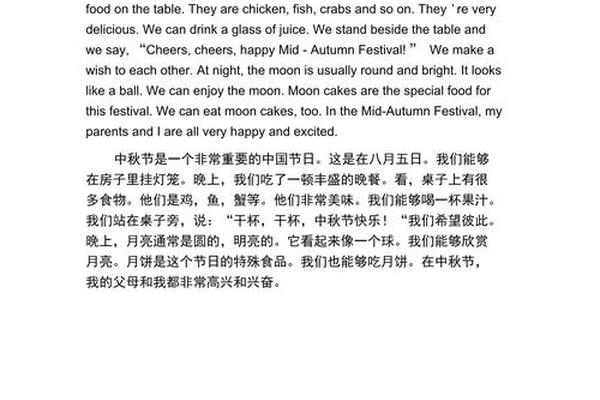以下是一篇关于中国传统节日文化及反映家文化的英语作文,结合了多篇要求中的信息,并按照学术写作的结构进行组织:
Traditional Chinese Festivals and Family Culture
China's traditional festivals serve as vital carriers of cultural heritage, deeply intertwined with the concept of "family cohesion" (家文化). These celebrations not only reflect agricultural cycles and historical legends but also emphasize the importance of familial bonds. Below are key festivals that embody family culture:
1. Spring Festival (春节): The Ultimate Family Reunion
As the most significant festival in China, Spring Festival marks the lunar new year. Families engage in rituals symbolizing unity:
2. Mid-Autumn Festival (中秋节): Moonlit Family Bonds

Celebrated on the 15th day of the 8th lunar month, this festival revolves around lunar worship and family unity:
3. Qingming Festival (清明节): Honoring Ancestors
Known as Tomb-Sweeping Day, Qingming (April 4–6) emphasizes filial piety:
4. Dragon Boat Festival (端午节): Collective Memories
Held on the 5th day of the 5th lunar month, this festival commemorates Qu Yuan while strengthening family ties:
5. Lantern Festival (元宵节): Concluding Spring Celebrations
On the 15th day of the first lunar month, families reunite to:
Cultural Significance of Family-Centric Festivals

These festivals highlight three core values:
1. Intergenerational Continuity: Rituals like tomb-sweeping and red envelopes ensure cultural transmission.
2. Collective Identity: Shared meals and activities reinforce a sense of belonging.
3. Harmony with Nature: Lunar and agricultural cycles remind families of their roots in both land and lineage.
In modern times, while globalization introduces foreign customs, preserving these festivals remains crucial. As one essay notes: "Losing traditional festivals means losing cultural roots, leaving individuals adrift like rootless duck".
Conclusion
Traditional festivals like Spring Festival and Mid-Autumn Festival are not merely dates on a calendar but living embodiments of China's family-centric ethos. By participating in these customs—whether making zongzi or sharing mooncakes—families perpetuate a cultural legacy that has thrived for millennia.
References:
此作文可进一步扩展,例如添加更多节日细节或对比现代与古代习俗。如需调整内容或格式,请随时告知!


